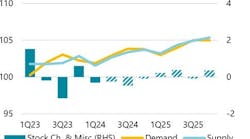By OGJ editors
HOUSTON, July 9 -- The price of natural gas in the US will increase to $6.50-7/MMbtu by 2015 because of cost pressure and rising demand, a Wood Mackenzie analyst told a conference in Denver.
Jen Snyder, principal natural gas analyst at the firm, said cost pressure will come from service costs and margins, competition with oil projects for rigs to drill horizontal wells, and an overall higher-cost economy.
In addition, producers will have to move toward higher-cost resources.
“The core, low-cost unconventional gas plays—Marcellus, Haynesville, and Barnett—will continue to grow,” Snyder said at the Energy Epicenter Conference. “But within a few years, as the pace of demand growth accelerates, more-expensive shale and tight-gas supplies will be required. Economy-wide inflationary pressures mean that, in nominal terms, prices could reach $8.50/MMbtu.”
The near-month futures price for natural gas on the New York Mercantile Exchange closed July 8 at $4.40/MMbtu.
Snyder said demand for gas in power generation will grow as coal plants are retired. Even without legislation calling for cuts in carbon-dioxide emissions, regulations by the US Environmental Protection Agency and local authorities might force retirement of 45 Gw of coal-fired power generation capacity by 2020. Gas demand might increase by 5 bcfd as a result.
By 2020, Snyder said, total gas demand growth in the power industry could be 8-10 bcfd.
On the question of US gas exports, the analyst said “the economics look extremely challenging” but added that desires of producers and buyers for supply and market diversity might support North American liquefaction.
“Much depends on how closely global gas prices will be linked to oil prices, how Russia may react to new competing supply from the US, and the extent and timing of new global unconventional gas supplies, for example in Poland or China—all of which remain uncertain,” Snyder said.
Cheniere Partners LP recently let a contract for design and construction of two liquefaction trains at its 4 bcfd Sabine Pass LNG receiving terminal in Cameron Parish, La. (OGJ, June 28, 2010, Newsletter).

